Recommended Reading Charts (by Author): Difference between revisions
From /lit/ Wiki
Jump to navigationJump to search
imported>Quaborator |
imported>Quaborator |
||
| Line 73: | Line 73: | ||
==H.P.Lovecraft== | ==H.P.Lovecraft== | ||
[[File:Slot_dunnwich_in_somewhr_too.png|thumb| | [[File:Slot_dunnwich_in_somewhr_too.png|thumb|right|284px]] | ||
* Lovecraft is not Edgar Allan Poe; expect no melodrama, no Victorian intellectual/literary masturbation. | * Lovecraft is not Edgar Allan Poe; expect no melodrama, no Victorian intellectual/literary masturbation. | ||
| Line 80: | Line 80: | ||
Take in the prose, especially the "encounters", ''slowly''; the prose is seemingly opaque and verbose, but it becomes very rewarding after getting used to the style. Think about it: Lovecraft does not have (or to be precise, ''didn't have'') at his disposal but the vocabulary of the English language to draw scenes as vivid (and horrific) as--eh, again--[http://www.youtube.com/watch?v=6QFwo57WKwg this]. | Take in the prose, especially the "encounters", ''slowly''; the prose is seemingly opaque and verbose, but it becomes very rewarding after getting used to the style. Think about it: Lovecraft does not have (or to be precise, ''didn't have'') at his disposal but the vocabulary of the English language to draw scenes as vivid (and horrific) as--eh, again--[http://www.youtube.com/watch?v=6QFwo57WKwg this]. | ||
Start exercising those imagination-muscles of yours, soldier! | Start exercising those imagination-muscles of yours, soldier! | ||
* You might wish to check the works of ''Thomas Ligotti'' as well. | |||
* You might also wish to read the Dunwich Horror after reading The Call of Cthulhu as well as Haunter in the Dark after The Colour Out of Space. | * You might also wish to read the Dunwich Horror after reading The Call of Cthulhu as well as Haunter in the Dark after The Colour Out of Space. | ||
Revision as of 11:21, 12 May 2012
Albert Camus
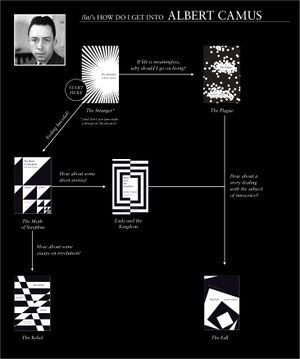
Ernest Hemingway

Franz Kafka

Haruki Murakami
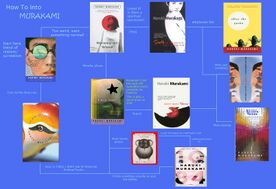
H.P.Lovecraft
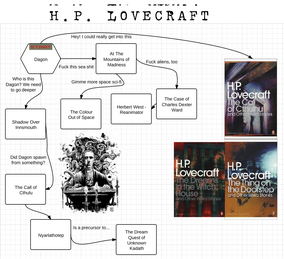
- Lovecraft is not Edgar Allan Poe; expect no melodrama, no Victorian intellectual/literary masturbation.
- The stories in the Cthulhu Mythos are more accessible to new readers compared with those in the Dream Cycle series. Start reading the former, and if you like it, move to the latter.
- The format of the stories in the Cthulhu Mythos are usually as follows: a slow setup where the character comes across something that does not feel right, followed by the character encountering whatever the setup was all about (like this), and finally, the character getting out of the encounter forever changed by their experience. At this point, the mysteries of the setup are, in a way, solved; you probably will have understood by then why things did not feel right at the beginning.
Take in the prose, especially the "encounters", slowly; the prose is seemingly opaque and verbose, but it becomes very rewarding after getting used to the style. Think about it: Lovecraft does not have (or to be precise, didn't have) at his disposal but the vocabulary of the English language to draw scenes as vivid (and horrific) as--eh, again--this. Start exercising those imagination-muscles of yours, soldier!
- You might wish to check the works of Thomas Ligotti as well.
- You might also wish to read the Dunwich Horror after reading The Call of Cthulhu as well as Haunter in the Dark after The Colour Out of Space.
G.K.Chesterton

Italo Calvino
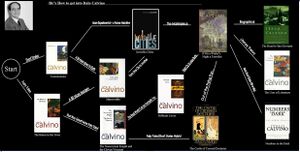
James Joyce
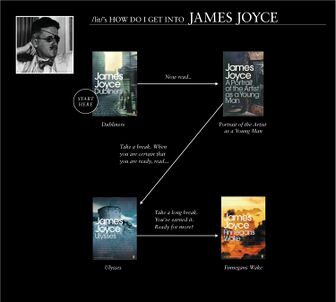
Neil Gaiman
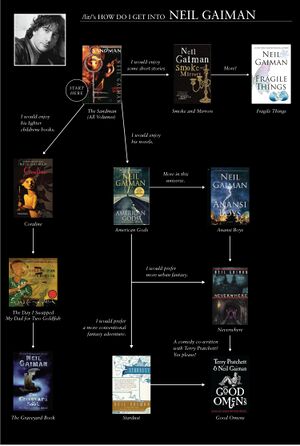
Thomas Pynchon

William Shakespeare
